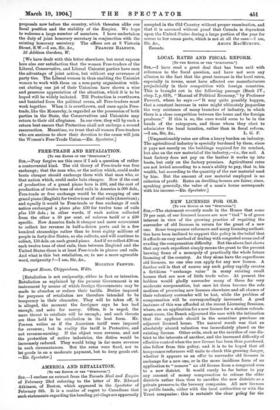FREE-TRADE AND RETALIATION.
[To TER EDITOR OP TICE "EPROM/MOB:9
SIR,—Pray forgive me this once if I ask a question of rather a controversial kind. The old theory of Free-trade was free exchange; that the man who, or the nation which, could make boots cheaper should exchange them with that man who, or that nation which, could make hats cheaper. Now if the cost of production of a grand piano here is £60, and the cost of production of twelve tons of steel rails in America is 300 dole., Free-trade or free exchange would be the swapping of one grand piano (English) for twelve tons of steel rails (American) ; and equally it would be Free-trade or free exchange if each nation exchanged a piano plus £30 for twelve tons of rails plus 150 dole.; in other words, if each nation collected from the other a 50 per cent. ad 'valorem tariff or a £30 specific. Now America finds it cheaper and more convenient to collect her revenue in half-a-dozen ports and in a few hundred steamships rather than to hunt eighty millions of people in forty-five States, so she collects, and will continue to collect, 150 dole. on each grand piano. And if we collect 230 on each twelve tons of steel rails, then between England and the United States there is at least Free-trade in pianos and rails. And what is this but retaliation, or, to use a more agreeable word, reciprocity am, Sir, &c., Draycot House, Chippenham, Wills. MORETON FREWEN.
[Retaliation is not reciprocity, either in fact or intention. Retaliation as explained by the present Government is an instrument by means of which foreign Governments may be made to abandon or reduce their tariffs. Duties imposed for purposes of retaliation are therefore intended to be temporary in their character. They will be taken off, it is alleged, the moment the foreigner says he has had enough, and asks for mercy. Often, it is urged, the mere threat to retaliate will be enough; and such threats are thus held to be retaliation in its best form. Mr. Frewen writes as if the American tariff were imposed for revenue ; but in reality the tariff is Protective, and not revenue-earning. If the object were revenue, and not the protection of native industries, the duties would be immensely reduced. They would bring in far more revenue in such circumstances. But the rates were fixed, not to let goods in on a moderate payment, but to keep goods out. —ED. Spectator.]










































 Previous page
Previous page